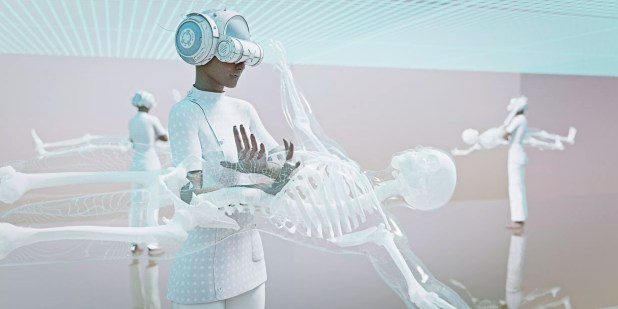Introduction to Healthcare in Metaverse
To increase the proficiency of medical equipment and widen the reach of medical services, the health industry has begun to utilize components such as augmented reality (AR), virtual reality (VR), and artificial intelligence (AI) in software and hardware. Healthcare in metaverse can change the layout of the industry in an amazing yet positive sense. All in all, the metaverse’s potential is enormous: from better surgical precision to medicinal applications, social-distancing accommodations, and more, all signals point to widespread acceptance as a disruptive healthcare shift. In 2022, the metaverse, like telemedicine and mobile device integration before it, has the potential to be a significant technological gamechanger in healthcare.
What is a Metaverse?
The metaverse, often known as the virtual universe, is a collection of interconnected online environments. In the metaverse, virtual avatars can participate in activities such as gaming, shopping, and even attending events. Use of web 3 standards like blockchain can improve ownership, online payments, traceability, and more in the metaverse.
Most people think of the metaverse as a virtual realm that they can access via a headset. It would link numerous digital worlds for anything from business to leisure activities. Those activities may include concerts, movie trips, or simply hanging out. Above all, the combination of metaverse and healthcare will be great.
What Examples Can You Give?
Here’s a look at what’s going on right now that could influence the metaverse of tomorrow:
Microsoft
- Microsoft’s Mesh platform allows developers to create mixed and extended reality (XR) apps. These apps combine the real world with augmented reality and virtual reality.
Meta
- Facebook has previously made large investments in virtual reality, most notably the acquisition of Oculus in 2014. Meta imagines a virtual world where digital avatars converse with one another through virtual reality headsets for various purposes.
Epic Games
- “It’s no secret that Epic is committed to developing the metaverse,” said Tim Sweeney, the CEO of Epic Games, the company that created Fortnite. There have been concerts by Ariana Grande and Travis Scott, as well as movie trailers and music debuts.
- It creates photorealistic artificial individuals with its MetaHuman Creator, which might be how you construct your digital doppelganger in future open-world games.
Minecraft
- Minecraft, a popular virtual universe owned by Microsoft and popular among children, is essentially the digital equivalent of Legos, in which players may create their digital character and build whatever they like. As of August, Minecraft had around 140 million monthly active users. It has exploded in popularity among children who, as a result of the pandemic, have had to rely more heavily on virtual connections.

In the Metaverse, What Does Healthcare’s Future Hold?
Learning and Training in the Medical Field
- VR is utilized in doctor and medical staff training to immerse learners in the human body, giving them a 360° view of diseases or simulating real-world procedures.
- Medical schools are also using AR in their curricula to provide students with significant hands-on learning opportunities. Medical students can visualize and practice new techniques by using augmented reality apps to replicate patient and surgical contacts.
- Immersive experiences based on real operations might be constructed, in which students sense and feel the repeated genuine procedure as if they were the surgeon themselves.
Fitness, Health, and Quality of Life are All Important Factors to Consider
- Gamification, or the application of game concepts to non-game situations, opens up new avenues for connecting healthcare practitioners and patients. At the moment, AR’s usage in healthcare is mostly limited to wellness and fitness apps; for example, AR is being utilized to give better workouts with coaching from virtual teachers.
- VR has also been demonstrated to help patients with dementia enhance their quality of life. Patients in one trial were given a virtual reality headgear and were able to ‘visit’ one of five virtual locales, including a church and a sandy beach. Researchers discovered that after 16 supervised sessions, individuals were better able to recall past experiences. This increased mood and gave good mental stimulation.
Surgical Treatments and Pre/Post-Operative Evaluations
- More sophisticated procedures will increasingly incorporate AR, building on the current use of surgical robots. The removal of malignant tumors to difficult spinal surgery are all possible applications. Above all, these advancements will improve surgical precision and flexibility in complex treatments even further.
- Already, AR is giving surgical staff new ways to access information that are more compatible with surgical workflows and the sterile field of the operating room, such as real-time guidance in the surgeon’s field of view of the surgical site via integration with surgical navigation systems and fusion of data from multiple imaging sources.
- Pre- and post-surgery evaluations can also benefit from the use of AR to improve surgical results through a more individualized intervention based on data analytics.
The Metaverse’s Potential in Healthcare
Metaverse will Transform Patient Visits and Support
- It’s one of the best uses of the metaverse in healthcare; we may envisage making virtual medical visits; not every visit necessitates a physical examination by a doctor; some visits are only for consultation.
- Telemedicine and teleconsultation services are rapidly expanding around the globe, and the metaverse will usher in a new era of physical visits.
Virtualization is Transforming Family Visits to Patients.
- Because of the Covid-19 outbreak, many hospitals have set restrictions on patient visits in the last two years. When we visit a friend or family member in the hospital after surgery or a grave health condition, we will see innovation in social measures.
How the Metaverse Can Help Radiology
- Radiology is one of the most technologically dependent services in healthcare. In the previous ten years, we’ve seen a lot of advancement in its technologies, from scanning equipment to software solutions that have released new powers in this field. Radiologists can work together in 3D on medical images even if they are in separate locations or nations.
The Use of Cryptocurrency and the Metaverse in Healthcare
- Because Metaverse is embracing blockchain and cryptocurrency technologies, individuals will likely be able to pay for healthcare with bitcoin. After all, it would serve as an alternative to traditional methods.
The Metaverse’s Medical Wearables
- In the last few years, medical wearables have enabled patients and clinicians to generate a large amount of useful health data that experts require.
- Data visualization is also vital for professionals to make educated judgments regarding their patients by making it easier and more relevant. Metaverse will enable the age of big data by improving visualization and collaboration. Besides this, making it smarter than it has ever been.
The Metaverse’s Challenges in Healthcare
- Getting the Metaverse’s Audience to Show Up
- Concerns about privacy and security in the metaverse
- Issues with Connectivity
- Technology’s High Price
- All Stakeholders Need New Business Models
Conclusion
If it comes with actual innovation to match people’s imagination and expectations, metaverse technology will alter healthcare practice soon. Virtual reality and augmented reality (VR/AR) solutions are already boosting patient experiences and outcomes. Even routine procedures like intravenous injections and blood draws can benefit from Accuvein’s vein mapping technology. This technology casts a map of a patient’s veins onto the skin. Here, we can say that metaverse VR or AR metaverse will be great in respect to the healthcare sector. Although the metaverse is still in its early stages, it has enormous potential to revolutionize and enhance healthcare.








